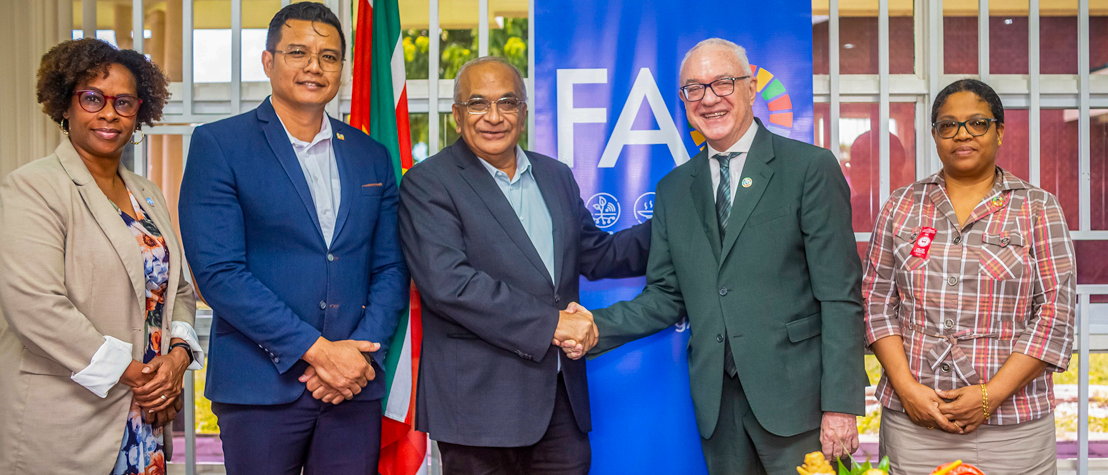FAO and Suriname sign strategic agreement to address hunger and accomplish the 2030 Agenda
FAO's Regional Representative, and the Minister of Agriculture, Animal Husbandry, and Fisheries participated in the ceremony and highlighted this initiative's importance to the country's development.

Minister of Agriculture, Livestock and Fisheries of Suriname, Mr. Prahlad Sewdien and FAO Regional Representative for Latin America and the Caribbean, Mr. Mario Lubetkin signed a strategic agreement.
©FAO/Ralph Van Huisduinen
The Assistant Director-General and Regional Representative for Latin America and the Caribbean of The Food and Agriculture Organization of the United Nations (FAO), Mario Lubetkin, visited today Suriname as part of his working tour in the Caribbean to consolidate technical cooperation ties with the subregion.
Along with Suriname's Minister of Agriculture, Animal Husbandry and Fisheries, Parmanand Sewdien, Lubetkin signed the Country Programme Framework (CPF) for 2023-2026. Marciano Dasai, Minister of Spatial Planning and Environment and Elizabeth Bradley Permanent Secretary Ministry of Foreign Affairs, International Business and International Cooperation, and Gillian Smith, FAO Representative ad interim in Suriname also participated in the ceremony.
This agreement focuses on Suriname's national development priorities, aligning them with FAO’s mandate oriented to promoting efficient, inclusive and sustainable production; end hunger and achieve food security and nutrition; promote sustainable management of natural resources and adaptation to climate change; and address the reduction of rural inequalities, poverty and the promotion of resilience.
“The strategic instrument signed sets forth the priority areas to guide FAO's partnership and support to the Government of Suriname. This framework reflects the shared commitment to transforming agrifood systems to be more efficient, inclusive, resilient, and sustainable for better production, better nutrition, a better environment, and a better life, leaving no one behind”, said Lubetkin
According to the recent State of Food Security and Nutrition in the World (SOFI 2024) report, in our region, significant progress has been made recently. This represents a reduction of 4.3 million people no longer suffering from hunger, mainly due to a recovery in South America.
“While this progress is encouraging, the hunger rate remains particularly high in subregions such as Mesoamerica and the Caribbean, compared to pre-pandemic level. We are at a critical moment where we must redouble our efforts to advance in the fight against hunger and ensure that we do not backslide”, he added.
Suriname’s capacities in natural resource management and its commitment to sustainable development provide a solid foundation for addressing these challenges. The new agreement aims to enhance agricultural productivity, protect the environment, and support regional efforts to reduce hunger through sustainable food production. By prioritizing the sustainable management of natural resources, the CPF contributes to ensure long-term food security and strengthen the resilience of local livelihoods.
In his remarks, Minister Sewdien highlighted the strong partnership between Suriname and the FAO, adding that food systems transformation is a critical development imperative for Suriname’s emerging economy. “For the government of Suriname this means that programs will be implemented to achieve the Sustainable Development Goals”, said Minister Parmanand Sewdien.
Another 15 countries in Latin America and the Caribbean have recently formalized Country Programming Frameworks with a vision of intersectionality, consensus, and articulation with different actors.
FAO ADG Witnesses firsthand impact of SAMAP project
FAO's Regional Representative concluded his visit to Suriname with a field visit to beneficiaries of the Suriname Agriculture Market Access Project (SAMAP), where he had the opportunity to see firsthand the positive impact of the project on the lives of small-scale farmers in the Saramacca region. He visited several farm communities where he interacted with project beneficiaries and observed the practical implementation of the project's activities.
"I am deeply impressed by the progress made under the SAMAP project," said Mr. Lubetkin. "The project is improving agricultural productivity, empowering rural communities, and contributing to food security in Suriname. FAO remains committed to supporting the government of Suriname in its efforts to develop a sustainable and resilient agriculture sector."
The SAMAP project, funded by the European Union and implemented by FAO, aims to enhance agricultural productivity, market access, and climate resilience among small-scale farmers in Suriname. The project focuses on improving agricultural practices, strengthening value chains, and promoting sustainable land management.
Contact
Maria Elena Alvarez Press and Content Officer [email protected]
